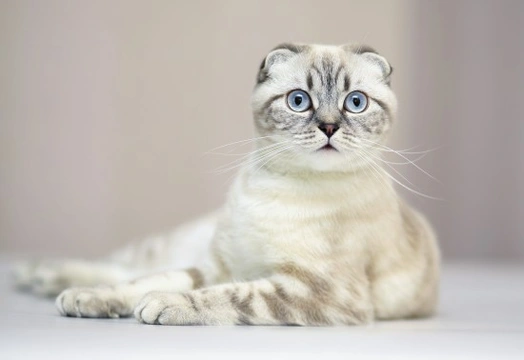
Osteodystrophy a Congenital Health Issue that Affects Scottish Folds
The Scottish Fold has to be one of the cutest looking little cats on the planet with their extraordinary curled back ears and large eyes. On the whole, they are a healthy breed and if they are going to suffer from any joint deformities, these tend to develop pretty early on in their lives when cats are around four to six months old. One sign there is a problem is when a Scottish Fold develops a shorter and thicker tail which is often missed if they have a longer coat.
The breed boasts a long lifespan which can be anything up to 15 plus years. However, the Fold is predisposed to one congenital health issue which is directly connected to the genetic mutation that causes the cartilage in their ears to develop abnormally. This mutation is called osteodystrophy and it can affect the cartilage in their bones too!
Severe Bone Abnormalities
Sadly, this genetic mutation can seriously affect the cartilage in a Fold's bones which can then lead to cats suffering from severe arthritis. Folds suffering with the condition are often in constant pain and it seriously impacts their movement and well-being.
Understanding Congenital Osteodystrophy
The condition can vary from cat to cat as to the severity of an abnormality, but the one constant is that all Scottish Folds may suffer from some degree of degenerative joint pain. In more severe cases, this can cause bones in their tails, ankles and stifles to fuse which results in cats not wanting to move around too much.
Some Folds will have an abnormal posture and walk strangely often showing signs of lameness. Others may have odd shaped and shortened legs both front and back. Luckily there are strict guidelines in place which go a long way in maintaining standards of health in the breed.
Only One Parent Should have the Mutated Gene
Only one of the parents should have the mutated gene responsible for the folds in the breed's ears which is why it's so very important to only contact a reputable Scottish Fold breeder if you are thinking about sharing your home with one of these lovely cats. A responsible breeder would never put a Scottish Fold to another Fold even if their ears don't turn back on themselves! As a rule of thumb, reputable breeders only mate a Scottish Fold with either a British Shorthair or an American Shorthair.
Should both parents have the mutated gene, the chances are their offspring may well suffer from congenital osteodystrophy. Should a Fold have inherited the disorder from their parents, the visible signs there is something terribly wrong usually start to appear when cats are between 4 to 6 months old. The symptoms then get worse and worse as the cat gets older. The signs to watch out for are as follows:
- Tails tend to be shorter and thicker than normal
- Bones seem to be thickened
- Bones are tender to the touch
- Cats show a real reluctance to jump
- Cats are not that eager to play because movement is difficult and painful
- Lameness
- As cats age, their walk alters and their legs move stiffly outwards
- Lack of coordination and slower movement
- Lethargy
- Severe Pain
No Cure for Congenital Osteodystrophy
Sadly, there is no known cure for the condition, but it is not life threatening. However, this is a very painful disorder for cats to have to live with. There are certain supplements that may help which includes products containing Glucosamine. These have been seen to help loosen joints and ease discomfort. If the condition becomes extremely severe, a vet would normally recommend putting a cat to sleep to save them suffering undue pain.
Conclusion
Scottish Fold catsare generally very healthy cats. However, it's essential that only one of the parents has the mutated gene otherwise if both parents have the gene, their kittens may well be born with a painful degenerative disorder called congenital osteodystrophy which could really affect their well-being for the rest of their lives. This is why it's so very important to only contact reputable Scottish Fold breeders if you are thinking about sharing your home and life with one of these lovely little cats.



